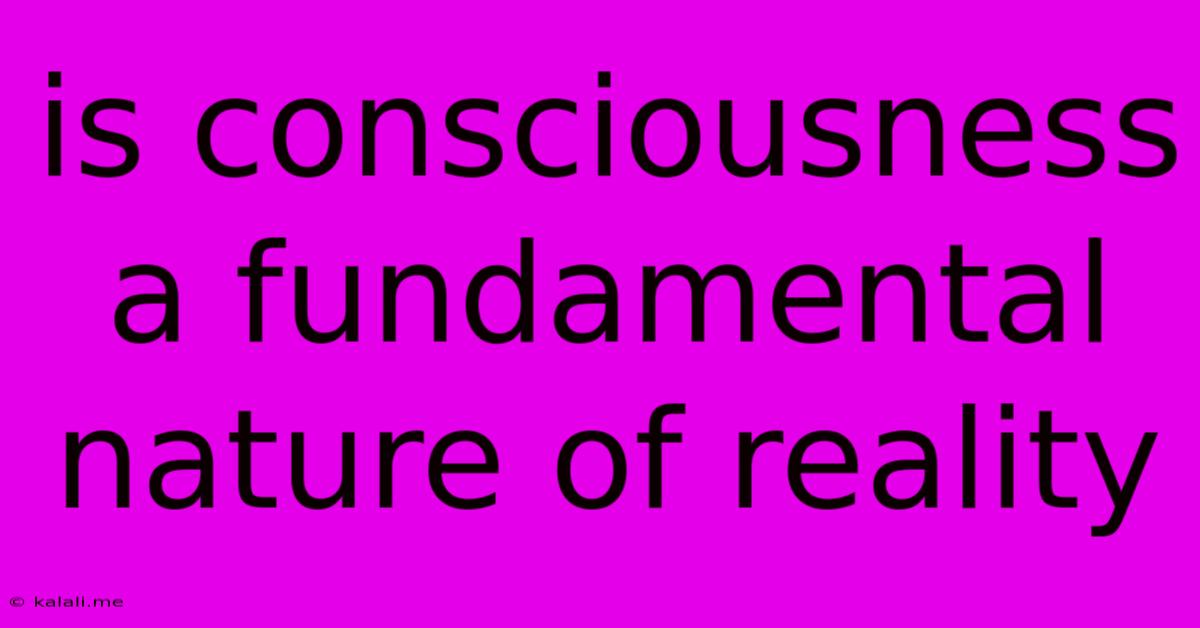Is Consciousness A Fundamental Nature Of Reality
Kalali
May 31, 2025 · 3 min read

Table of Contents
Is Consciousness a Fundamental Nature of Reality? Exploring the Hard Problem
The question of whether consciousness is a fundamental aspect of reality is a profound and enduring one, captivating philosophers, scientists, and theologians alike. This article delves into the "hard problem of consciousness," examining different perspectives and exploring the implications of viewing consciousness as either emergent or fundamental. Understanding this debate is crucial for advancements in fields ranging from neuroscience to artificial intelligence.
What is the Hard Problem of Consciousness?
Philosopher David Chalmers famously articulated the "hard problem" of consciousness: How do physical processes in the brain give rise to subjective experience? While we can explain the neurological correlates of consciousness – the brain activity associated with conscious experience – we still lack a satisfactory explanation for why these physical processes feel like something. This "feeling," or qualia – the redness of red, the sweetness of sugar – remains a mystery.
The easy problems of consciousness, on the other hand, address the functional aspects: attention, information processing, self-awareness. These can, in principle, be explained through computational and neuroscientific approaches. The hard problem, however, delves into the subjective experience itself – the "what it's like" aspect.
Consciousness as an Emergent Property:
The dominant scientific view considers consciousness as an emergent property. This means that consciousness arises from the complex interactions of physical systems, like the intricate network of neurons in the brain. Just as wetness emerges from the interaction of water molecules, consciousness, according to this perspective, emerges from the complex interactions within the brain. There is no "consciousness stuff" added; it's a property that unexpectedly appears at a certain level of complexity.
Arguments for Emergent Consciousness:
- Neuroscientific evidence: Brain damage can dramatically alter consciousness, highlighting the link between brain activity and conscious experience.
- Biological evolution: Consciousness likely evolved gradually, suggesting a naturalistic explanation rooted in physical processes.
- Computational models: Some researchers believe that sufficiently complex computational systems could potentially generate consciousness.
Consciousness as a Fundamental Aspect of Reality:
However, a growing number of thinkers argue that consciousness is not merely emergent but fundamental – a property inherent in the universe itself, like space, time, or energy. This perspective, sometimes termed panpsychism or integrated information theory (IIT), suggests that consciousness is not confined to brains or even living organisms.
Arguments for Fundamental Consciousness:
- The Hard Problem: The difficulty in explaining subjective experience through purely physical processes fuels the idea that consciousness might be a fundamental aspect of reality.
- Panpsychism: This view posits that consciousness is a ubiquitous property of the universe, present in varying degrees across all matter.
- Integrated Information Theory (IIT): IIT proposes that consciousness is a fundamental property of systems with high levels of integrated information, suggesting a measure of consciousness that can be applied to diverse systems.
Implications and Further Research:
The question of whether consciousness is fundamental or emergent has profound implications for our understanding of the universe and our place within it. If consciousness is fundamental, it challenges our materialistic worldview and raises intriguing questions about the nature of reality. Further research in neuroscience, physics, and philosophy is crucial to shed light on this enduring mystery. Exploring the relationship between information processing, complexity, and subjective experience remains a key area of investigation.
Ultimately, the question of consciousness's fundamental nature remains open. While the emergent view currently dominates mainstream science, the hard problem persists, leaving room for alternative perspectives and stimulating ongoing investigation into the very fabric of reality.
Latest Posts
Latest Posts
-
Mad Hatter Once Upon A Time
Jun 02, 2025
-
Macbook Pro Power Button Not Responding
Jun 02, 2025
-
How Long Were The Israelites In Slavery In Egypt
Jun 02, 2025
-
Can You Take Pictures Of The Sun
Jun 02, 2025
-
How Long Can Eggs Last In Fridge
Jun 02, 2025
Related Post
Thank you for visiting our website which covers about Is Consciousness A Fundamental Nature Of Reality . We hope the information provided has been useful to you. Feel free to contact us if you have any questions or need further assistance. See you next time and don't miss to bookmark.